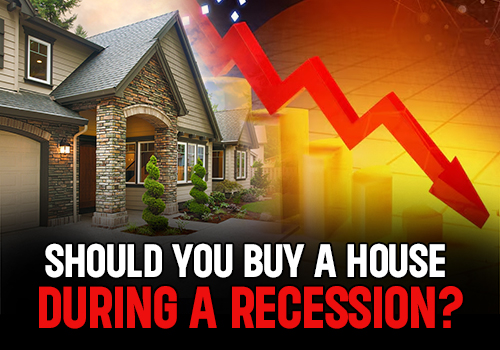Should you buy a house during a recession?
Thursday, August 22, 2024


Buying a house during a recession can feel like a risky move, leaving many people uncertain about whether it's the right time to invest in property. Concerns about job security, falling home prices, and the overall economic outlook often weigh heavily on potential buyers. However, a recession can also present unique opportunities for those in a stable financial position. In this blog, we'll explore the pros and cons of buying a house during an economic downturn, helping you make an informed decision in uncertain times.
Understanding a Recession:
A recession is a period of economic decline marked by a drop in consumer spending, rising unemployment, and a slowdown in business activity. During a recession, the housing market often experiences lower demand, leading to a decrease in home prices. This can create a buyer’s market where properties are more affordable, but it also reflects the broader economic challenges people face for example, at Bellevue Real Estate.
Historically, recessions have varied in their impact on home prices. For example, during the 2008 financial crisis, home prices dropped significantly due to widespread foreclosures and reduced buyer confidence. However, in other recessions, like the early 2000s, the impact on the housing market was less severe. While lower prices can benefit buyers, it’s essential to remember that economic uncertainty can make it harder to secure financing and can carry the risk of further price declines. Understanding these dynamics is key to making a wise decision.
Pros of Buying a House During a Recession
Buying a house during a recession might seem daunting, but there are several advantages that can make it a smart move for the right buyer. Here are some key benefits:
-
Lower Home Prices: During a recession, home prices often decline, which can make purchasing more affordable. This creates an opportunity to buy at a lower price than during a booming market.
-
Less Competition: With fewer people looking to buy, the market isn't as crowded. This means more options for you and a better chance of finding the perfect home.
-
Negotiation Power: Sellers during a recession may be more willing to negotiate. Whether it’s on price, closing costs, or repairs, you might find yourself in a stronger position to get a deal that suits your budget.
-
Lower Interest Rates: Recessions often lead to lower interest rates, making mortgages more affordable and reducing the overall cost of buying a home.
-
Incentives from Sellers: Sellers eager to close may offer additional incentives, like covering closing costs or including home warranties, making the deal even sweeter for buyers.
Cons of Buying a House During a Recession
Buying a house during a recession comes with significant risks that potential buyers should carefully consider. While there can be advantages, it's crucial to be aware of the potential downsides.
-
Economic Uncertainty: Recessions often bring job losses or reduced income, which can make it challenging to keep up with mortgage payments and other financial obligations.
-
Tighter Lending Standards: During a recession, banks may become more cautious, tightening mortgage requirements. This can make it harder to qualify for a loan, even if you have a good credit score.
-
Potential for Further Price Drops: While home prices may already be lower during a recession, there’s always the risk that they could drop further after your purchase, potentially leaving you with a property worth less than what you paid.
-
Lower Property Values: The overall decrease in demand during a recession can lead to a decline in property values, affecting your home’s long-term investment potential.
-
Uncertain Market Recovery: It’s hard to predict when the market will recover, which means your investment might not appreciate in value as quickly as you’d hope.
Factors to Consider Before Buying
When thinking about buying a house during a recession, it’s crucial to weigh several key factors to ensure you’re making a wise decision. Here are some important considerations:
-
Your Financial Stability: Make sure you have a secure job and a healthy savings cushion. A stable income is essential during uncertain economic times.
-
Interest Rates: While interest rates may be lower during a recession, they aren’t guaranteed to stay that way. Locking in a low rate can save you money in the long run.
-
Long-Term Investment: Consider whether you’re ready for a long-term commitment. Home prices may fluctuate, so it’s wise to view the purchase as a long-term investment.
-
Market Research: Understand the local market conditions. Some areas may be more resilient during a recession, offering better opportunities.
-
Emergency Fund: Ensure you have an emergency fund in place to cover unexpected costs, such as home repairs or temporary income loss.
Tips for Buying a House During a Recession
Buying a house during a recession requires careful planning and strategy. Here are some essential tips to guide you through the process:
-
Get Pre-Approved for a Mortgage: Secure financing early to strengthen your buying position and understand what you can afford.
-
Research the Market: Understand local market conditions to identify areas where prices may be more favorable.
-
Work with a Knowledgeable Realtor: Choose an experienced agent who understands the nuances of buying in a recession.
-
Be Prepared for Negotiations: Use the economic climate to your advantage when negotiating price and terms.
-
Assess Long-Term Stability: Ensure your financial situation is stable to weather potential future uncertainties.
Conclusion:
As concluded, buying a house during a recession has both advantages and risks. While lower prices and reduced competition can be appealing, financial stability and market conditions are crucial. Carefully assess your personal situation and seek professional advice to make a well-informed decision that aligns with your long-term goals.
Categories:
Market Update
We would like to hear from you! If you have any questions, please do not hesitate to contact us. We are always looking forward to hearing from you! We will do our best to reply to you within 24 hours !





